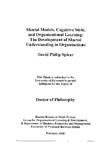Mental models, cognitive style, and organisational learning : the development of shared understanding in organisations
| dc.contributor.supervisor | Chaston, Ian | |
| dc.contributor.author | Spicer, David Philip | |
| dc.contributor.other | Plymouth Business School | en_US |
| dc.date.accessioned | 2011-05-11T09:19:50Z | |
| dc.date.available | 2011-05-11T09:19:50Z | |
| dc.date.issued | 2000 | |
| dc.identifier | Not available | en_US |
| dc.identifier.uri | http://hdl.handle.net/10026.1/363 | |
| dc.description.abstract |
Organisational learning is seen by many to be a key determinant of organisational performance. This is demonstrated by the growth of the 'learning company' concept (Pedler et al. 1991), and by the suggestion that the ability to learn faster than one's competitors is the only sustainable competitive advantage (DeGeus 1988). Consequently, organisations need to integrate and maximise the knowledge and learning of their individuals, and central to the learning process in firms is an effective means of transferring knowledge and learning between individuals and their organisation as a whole. Mental models (individual and shared) have been postulated as a mechanism through which this occurs (Senge 1990a; Kim 1993; Hayes and Allinson 1998). An individual mental model can be characterised as a simplification or representation of understanding of an idea, notion, process or system which provides the cognitive framework in which that individual's knowledge in respect of that issue is stored, whilst shared (group or organisational) mental models can be characterised as the common elements that exist between individual mental models. Both of these have been theoretically linked with individual and organisational learning. Literature in respect of individual and organisational learning, mental models and a third issue cognitive style is reviewed. Cognitive style represents the way individuals obtain, store and operationalise knowledge, and is included here as it is recognised as potentially affecting how learning and mental models interact (Hayes and Allinson 1998). A research model is posited which integrates key theory in respect of these three concepts, and research undertaken in two phases is presented. Phase One focused upon the representation of individual and shared mental models through semi-structured causal interviews with senior mangers in participant organisations, whilst Phase Two involved organisation wide surveys of these models, aspects of learning and cognitive style. Results obtained suggest that the complexities of an organisation, its environment, learning and mental models all mitigate against the identification of a simple relationship between these constructs. However some of the sources of these complexities are identified and suggested, and it is posited that the progression of work addressing organisational learning would best be served through a case study approach addressing the sources of complexity and effectiveness of learning in relation to specific mental models and within organisations. | en_US |
| dc.language.iso | en | en_US |
| dc.publisher | University of Plymouth | en_US |
| dc.subject | Knowledge transfer | en_US |
| dc.subject | Performance Management Psychology | en_US |
| dc.title | Mental models, cognitive style, and organisational learning : the development of shared understanding in organisations | en_US |
| dc.type | Thesis | |
| dc.identifier.doi | http://dx.doi.org/10.24382/3751 | |
| dc.identifier.doi | http://dx.doi.org/10.24382/3751 |
Files in this item
This item appears in the following Collection(s)
-
01 Research Theses Main Collection
Research Theses Main


